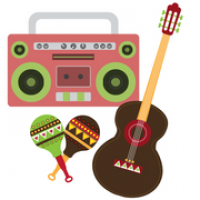
A trio of music therapy reviews featured in last year’s Australian top 100 Cochrane Library downloads, with Music Therapy for depression coming in at number 7, Music Therapy for people with spectrum disorder at number 40 and Music Therapy for people with dementia at 76. Last month a new update of Music interventions for cancer patients took centre stage and made headlines around the world, finding that music may have beneficial effects on anxiety, pain, fatigue, depression and quality of life for people with cancer.
‘It’s great to see these reviews are the subject of so much interest and discussion,’ says Emma Donoghue, resident music therapist and evidence officer with Cochrane Australia. ‘Sometimes we find that people confuse music therapy with music education or entertainment, or perhaps think it involves mysterious crystals and incense. But these reviews help us highlight that music therapy is a well-established, research-based profession that supports the health and well-being of children and adults of every age, often at very difficult times in their lives. It’s an amazing profession to be a part of.’
Emma graduated from the University of Melbourne’s Masters of Music Therapy program two years ago, gaining the theoretical grounding and practical clinical placement experience necessary to pursue a career in the field. ‘Music therapists are trained to use music to support people to improve their health, functioning and well-being. You need to cover a lot of complex theoretical and practical territory to become accredited,’ Emma explains. ‘But in simple terms, you look at particular age groups, conditions and settings and the different types of interventions that can meet the needs of individuals. In a session, a music therapist chooses and adapts music experiences to meet the needs, preferences and ability levels of the people that they're working with. Some of these music experiences include listening to music, singing familiar songs, playing instruments, improvising music on instruments or voice, song writing, moving to music, or discussing someone’s emotional reaction or meaning attached to a particular song or improvisation.’
‘The music is just one part of the equation though, as music therapy happens within the context of a therapeutic relationship. So you need to have essential skills to build these relationships, like rapport-building, empathy and counselling skills. What a person needs can change from session to session, or even within a single session, so the idea is to build a toolkit of music therapy techniques that you can draw on to meet the client’s changing needs in the moment. Throughout the training, your theoretical knowledge and practical skills are put into practice in various clinical placements within hospitals, schools, aged and palliative care, and community settings. These really give you a sense of the challenges and rewards of working with different populations, and sometimes they’re not what you’d expect.’
‘One of my early placements was at a respite care facility for people with progressive neurological conditions like MS and Motor Neurone Disease. I anticipated that this might be a sad or depressing experience, but despite the emotional challenges, it turned out be really rewarding to go in and do something positive to help each person in some way. And not with the usual interventions like feeding, medication and hygiene, but with something that recognised and connected with them as a person and enabled them to be something other than a long-term patient. This is so important given people can feel their identities are reduced to just this person in a hospital bed. The Australian Music Therapy Association just launched a campaign called RMTS change lives, which features six short animations highlighting the kind of work that we do with different populations. The first two focus on babies and children with disabilities, with more to follow in areas like mental health, aged care and palliative care. This is a great way to see how music therapists make a difference to individual patients and families alike.’
This focus on individual, personalised and responsive treatment is what differentiates the field of music therapy from music medicine, which is another area of increasing interest to researchers. The latter focuses more on the physiological impacts of music and does not involve a therapist. So for example a recent review in The Lancet looked at 7,000 patients who listened to pre-recorded music before, during and after surgery and found the experience of listening to music could actually lower the activity of the nervous system and reduce pulse rate, breathing and blood pressure. They also found pain, anxiety and even the need for pain medication were reduced.
Interestingly, the latest update of the Cochrane review of Music interventions for cancer patients includes and compares both music medicine and music therapy studies. It suggest that music therapy interventions lead to more consistent results across studies than music medicine studies, which is likely due to the fact that music therapists are trained to meet the patient’s in-the-moment needs when offering live music, rather than offering a limited selection of pre-recorded music which mightn’t be suitable for all patients. The review also found that participants overwhelmingly preferred the music therapy sessions because of the personal attention and care, the creativity of the interactive music making, and the opportunity for emotional expression through singing and playing instruments.
This resonates with Emma and her experiences of music therapy to date. ‘I worked with an older lady with MS, who was weak, in pain, and had a lot of trouble sleeping. Each week I’d visit and she would request different music – be it bright and sparky or something romantic. Sometimes she would fall asleep while I played and sang her preferred songs, which was great as she was so tired yet had trouble sleeping. She would say to me ‘Even if I’m asleep, just keep playing dear. When you’re here I just feel better.’’
